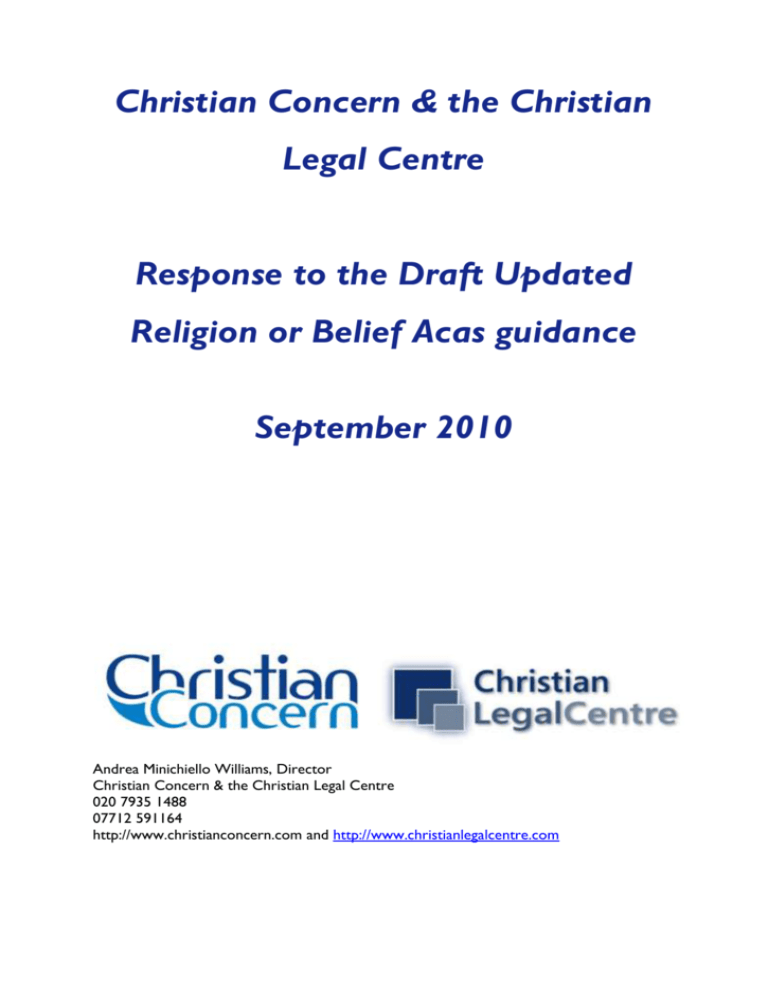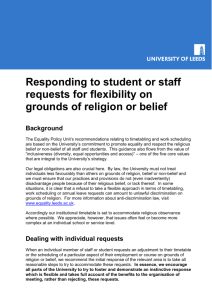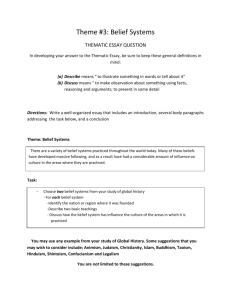Response to the Draft Updated Religion or Belief Acas guidance
advertisement

Christian Concern & the Christian Legal Centre Response to the Draft Updated Religion or Belief Acas guidance September 2010 Andrea Minichiello Williams, Director Christian Concern & the Christian Legal Centre 020 7935 1488 07712 591164 http://www.christianconcern.com and http://www.christianlegalcentre.com About Us Christian Concern is a policy and legal resource centre that identifies changes in policy and law that may affect the Judeo-Christian heritage of this nation. The team of lawyers and advisers at Christian Concern conduct research into, and campaign on, legislation and policy changes that may affect Christian Freedoms or the moral values of the UK. Christian Concern reaches a mailing list of 25,000 supporters. http://www.christianconcern.com Christian Concern is linked to a sister and separate organisation, the Christian Legal Centre, which takes up cases affecting Christian freedoms. http://www.christianlegalcentre.com Introduction 1. Acas produced the current guidance on religion or belief in 2003 to assist in the preparation of the introduction of the Employment Equality Regulations. 1The draft guidance is now being updated and entitled “Religion or belief and the workplacePutting the Equality Act 2010 into practice”. 2. We welcome the opportunity to comment upon this draft guidance. ACAS guidance has a central role to play in good employment practice. However, two issues are of particular concern, firstly, the lack of time to comment and secondly the absence of the usual 12 week public consultation period. The limited consultative approach here contrasts with the original guidance which Acas has consulted widely upon. For such important guidance, it would be far better to delay its publication to allow proper time for public consultation, even if the guidance is produced after October, which is the expected implementation date of the Equality Act. 3. The Acas request for comments on the draft guidance is based upon views on whether or not the advice remains appropriate and relevant. In particular, comments are welcomed on whether Section 2 (Religion or belief and the workplace: some key areas) focuses on correct issues; and whether the materials on commonly practised religions in Appendix 2 remains accurate. Comments in Response Introduction to the Draft Guidance 4. The original guidance refers to guidance for both employers and employees, by contrast, the introduction here refers to only giving “managers practical help in complying with the Equality Act 2010”. It is useful for employees as well as employers to have guidance, leaving open the question of whether or not there will be separate guidance for employees. In our opinion, the neutral stance adopted by the original guidance covering both employers and employees is far preferable to provide a 1 See Acas guide for employers and employees-Religion or Belief and the Workplace: http://www.acas.org.uk/media/pdf/f/l/religion_1.pdf definitive joint guidance for employment issues on “Religion or belief and the workplace”. Section One – What the law says Political Beliefs 5. Paragraph 1.1 provides a boxed description of a 2009 Employment Appeal Tribunal Decision on the meaning of philosophical belief without giving any case sighting. It would be helpful to do so in order to assess the relevance of the case to the particular circumstances which have arisen. It is assumed that this is the case on a “belief” in Climate change.2 6. There is some concern about the draft guidance3 mentioning political beliefs as a protected belief even if the position is stated to be currently “unclear”. An article in the spring of 2010 of Personnel Today, a publication for Human Resources managers, quoted a Government spokesperson as stating that: The government does not think that views or opinions based on scientific, or indeed on political, theories can be considered to be akin to religious beliefs or philosophical beliefs. Nor was it the intention in introducing the legislation that such beliefs should be covered.4 7. It is significant to note that the above Governments spokesman comment was reported after the Climate change case of 2009. It may be more appropriate for the guidance to state that it will be up to an Employment Tribunal or Court to determine the scope of philosophical beliefs.5 Perhaps noting that an EAT tribunal has allowed beliefs in climate change to be included. 8. In addition, it would be helpful to repeat the statement in the recent Acas guidance on the Equality Act –What’s new for Employers, namely that : Humanism is a protected philosophical belief but political beliefs would not be protected.6 Examples of Discrimination to include Christians 9. There is a tendency to sideline Christians and perceive them as perpetrators rather than victims of discrimination, though in practice this is no longer appropriate as Christians are often the victims of discrimination,7 and there has been a change since the original guidance was written. To reflect that change in an updated guidance, it 2 See http://www.bindmans.com/fileadmin/bindmans/user/News_stories_-_PDFs/Tim_Nicholson/Nicholson__EAT_Judgement_03_11_09.pdf 3 See the boxed comments under paragraph 1.1. 4 See Equality Bill guidance on protected beliefs 'confusing' for employers, Personnel Today 10 March 2010. http://www.personneltoday.com/articles/2010/03/10/54591/equality-bill-guidance-on-protected-beliefsconfusing-for.html 5 See similar comment on the last sentence of page 2 of the current guidance. 6 See quote from The Acas guide –The Equality Act-What’s New for Employers page 7 under the heading of religion or belief - http://www.acas.org.uk/CHttpHandler.ashx?id=2833&p=0 7 See all of the examples of cases on the Christian Legal Centre website: http://www.christianlegalcentre.com/ would be helpful if the guidance could put the focus upon Christians as victims of discrimination rather than the perpetrators of discrimination.8 Harassment Definition Reasonable discussion as opposed to harassment 10. A new slant has been added to the definition of harassment in the Equality Act 2010. It now has an independent emphasis in deciding if the conduct has the purpose or effect of harassing someone9, and whether it is reasonable for the conduct to have that effect. 10 Overall, in deciding whether conduct has that harassment effect, consideration has to be given to the perception of the Claimant, the other circumstances of the case and whether it is reasonable for the conduct to have that effect will be taken into account. The importance of reasonableness in decision making on whether or not the conduct complained of may be regarded as harassment needs to be both included and stressed in this updated guidance. 11. The new approach in the Equality Act to harassment contrasts with the 2003 Employment Equality (Religion or Belief) Regulations, where the regulations had an emphasis upon the subjective perception of the victim. The conduct was regarded as having that effect only if regard to all the circumstances, including in particular, the perception of the Claimant, it should reasonably be considered as having that effect.11 The reasonableness test of conduct has now been separated from the subjective emphasis on the perception of the Claimant to allow for a separate objective test of reasonableness. 12. The human rights of freedom of speech and freedom of thought, conscience and religion should ensure that religion does not become a taboo subject in the workplace. It is important that a distinction is drawn between having a reasonable discussion about your religious beliefs and the circumstances where this may harass someone. 13. A Christian in the workplace should be able to talk about his or her Christian activities outside the workplace, in the same way that other non-religious employees 8 See paragraph 1.2 page 4 where the example of the Hindu being discriminated against because of not fitting in with the rest of the work force who are predominantly Christian, where the roles could be reversed. See also paragraph 1.5 with reference to a Muslim worker receiving third party harassment 9 Harassment is where conduct has the purpose or effect of violating B’s dignity, or creating an intimidating, hostile degrading, humiliating or offensive environment. 10 See section 26(4) (c ) of the Equality Act 2010; http://www.legislation.gov.uk/ukpga/2010/15/section/26 11 See regulation 5 of the Employment Equality( Religion or Belief) Regulations 2003: http://www.legislation.gov.uk/uksi/2003/1660/regulation/5/made Compared to section 26 (4) of the Equality Act 2010 which describes the reasonableness test separately: In deciding whether conduct has the effect referred to in subsection (1)(b), each of the following must be taken into account— (a)the perception of B; (b)the other circumstances of the case; (c) whether it is reasonable for the conduct to have that effect. http://www.legislation.gov.uk/ukpga/2010/15/section/26 talk about what they have done. It is unfortunate that the useful “Some frequently asked questions” chapter has been removed from this guidance. The question and answer chapter includes the specific question of whether or not we should ban discussions about religion or belief from the workplace because of concern that someone might complain about harassment. The sensible answer is then given that if harassment has been explained to staff they should be able to distinguish between reasonable discussion and offensive behaviour. It then goes on to say that a ban on discussions about religion or belief may create more bad feeling amongst staff and cause more problems than it solves. 12 14. The importance for the rights of freedom of speech of including, this sensible and reasonable type of approach to religious discussion in the workplace in the guidance is enhanced by the new reasonable test requirement to assess the effect of such alleged harassment conduct. Section Two Recruitment Our Concerns for Christians and Sundays 15. The examples given of adapting recruitment methods in paragraph 2.1 of the draft guidance to avoid Friday afternoons or periods of fasting, focuses upon other religions and fails to consider Christians. For Christians, the guidance needs to ensure that recruitment, training and other methods avoid weekend venues on a Sunday which would conflict with Christians who wish to reserve Sunday as a day of rest and worship. In general terms, the draft guidance is written from the perspective of other religions only and tends to marginalise and sideline Christians. To remain appropriate and relevant the updated guidance needs to address this issue. 16. The current guidance under this heading of recruitment refers to the rights of those who work in the retail or betting trade to opt out of Sunday working by giving their employer three months notice to do so.13 It would be helpful for Christians who work in retail and do not wish to work on Sunday to continue to include this point in the guidance.14 Harassment and workplace behaviours 17. The description of harassment in the workplace in paragraph 2.2 also needs to include and take account of the need for a reasonableness test. For example, it appears to ignore this test, when it states that “Workers should understand that merely saying “no offence was intended” will not constitute a defence.” Of course, whether or 12 See Chapter 7 –Some frequently asked questions, page 31 of the Acas guide for employers and employeesReligion or Belief and the Workplace: http://www.acas.org.uk/media/pdf/f/l/religion_1.pdf 13 See paragraph 2.11 of the Acas guide for employers and employees-Religion or Belief and the Workplace: http://www.acas.org.uk/media/pdf/f/l/religion_1.pdf 14 See Sunday Trading Law for England and Wales, Herefordshire Council http://www.herefordshire.gov.uk/business/39240.asp not it is a defence to say that in a particular case will be dependent upon, if in the circumstances of the case, it was reasonable or not for such conduct to have an harassment effect. However, the draft guidance fails to put such a comment within that important context. Time off for Religious Observance 18. Paragraph 2.3.of the draft guidance helpfully advocates adopting a reasonable and sympathetic attitude to time off for religious observance for religious festivals. However, no mention in this section is made of adopting a sympathetic and accommodating attitude towards Christians not being asked to work on a Sunday due to the importance of that day for Christian religious observance and worship. Dietary Requirements 19. Some religions or beliefs have specific dietary requirements. The suggestion is given here that you do not have to provide specific foods such as Halal or Kosher at work related gatherings if it is not proportionate to do so, but you should still ensure that there is some appropriate food available (e.g. vegetarian). Unfortunately, in practice due to political correctness, interfaith events may result in reducing everything to the lowest common denominator so that only the vegetarian option is available. On an interfaith basis this gives the wrong impression that Employers are only taking account of the needs of other faiths. Modesty 20. It would be helpful and more informative if paragraph 2.6 of this draft guidance gave some more details of which religions this modesty requirement applied to and for what reasons. Dress 21. Paragraph 2.8 of the draft guidance on dress at work, states that the guiding principle in assisting decision making should always be based around the “impact of their dress upon the ability to do the job”. The rest of this paragraph also looks at wearing jewellery. 22. In our opinion, more emphasis needs to be placed upon Employers being reasonable in the wearing of jewellery as part of the dress code. This is of particular relevance for Christians who wish to wear a cross. It would be appropriate and helpful if the words in bold as a guiding principle were changed to state, “impact of their dress or jewellery upon the ability to do the job”, so that this includes jewellery. To emphasise jewellery, in the sentence which starts with the importance of fairness being paramount for dress codes, the words “and the wearing of jewellery” could be added to the end of the sentence. Similarly, in the box with advice on good practice on dress codes at work, the question of jewellery should be included as an issue for a right of employee appeal, which currently only mentions dress or attire. Monitoring religion and belief 23. The monitoring form not being compulsory is helpful and appropriate. The draft guidance suggests that the monitoring form should include the option for employees to state any non-religious beliefs they have. It is important that simple questions such as What is your religion are used. The guidance should state that questions should be based upon the National Census classification, so that Christian includes Church of England, Catholic, Protestant and all other Christian denominations. 15 We have been informed that the NHS may keep figures which splits up the percentage figures for employees into different Christian denominations, and then gives a misleading impression that there are proportionately more people of either no religion or of other religions. Such misleading monitoring information may then inappropriately impact upon policies and practices within an organisation and fail to adequately take account of Christian workers. Religion or Belief and other protected characteristics 24. We submit that paragraph 2.10 should be deleted from the guidance as it fails to advocate good employment practice measures. It is inappropriate to argue that a robust view should be taken to Equality policy, and then illustrate this by an example of an employment tribunal case of how sexual orientation trumps religious rights. It is contrary to the advice in the rest of the guidance which advocates that fairness and good job performance go hand in hand,16 creating an environment in which noone is put at a disadvantage because of their religion or belief,17 and advocates good practice measures that will help avoid putting people who hold or do not hold religious or philosophical beliefs at a disadvantage in the workplace.18 25. The employment tribunal case quoted as an illustration here of a robust view of Employers to an Equality policy is presumably that of Gary McFarlane. The case is described as a counsellor working for relationship counselling services who refused to provide psychosexual therapy to same sex couples because he believed it would conflict with his religious beliefs. This is incorrect as Gary McFarlane just stated on a training course that he may theoretically have some difficulty with providing such services. A press commentary has criticised the final decision in this case as being divisive. 19In our opinion, it is a case of Justice denied. 20 15 See 2001 National Census: http://www.statistics.gov.uk/cci/nugget.asp?id=954 See suggested question 20 for 2011 Census, we disagree that no religion should alphabetically be first in the questions as this was not the case for the 2001 census and may lead to higher none religious figures. http://www.ons.gov.uk/census/2011-census/2011-census-questionnaire-content/index.html 16 See the introduction of this draft guidance on “Religion or belief and the workplace-Putting the Equality Act 2010 into practice”. 17 See the introduction of this draft guidance on “Religion or belief and the workplace-Putting the Equality Act 2010 into practice”. 18 See the first paragraph of section 2 on Religion or Belief and the workplace-some key areas, of this draft guidance on “Religion or belief and the workplace-Putting the Equality Act 2010 into practice”. 19 See The comment in the Telegraph on the Divisive law of Lord Justice Laws; http://www.telegraph.co.uk/comment/columnists/christopherbooker/7664681/The-divisive-law-of-Lord-JusticeLaws.html 20 See press release of Justice Denied for Christians as Counsellor Refused Right to Appeal of the Christian Legal Centre, dated the 29 April 2010: http://www.christianlegalcentre.com/view.php?id=1063 26. It would be inappropriate to include this paragraph 2.10 in the guidance, as according to the Christian Institute Summer 2010 update, the long running legal case of Lillian Ladele the Christian registrar disciplined over her stance on civil partnerships is heading for Europe. Lawyers will lodge papers with the European Court of Human Rights, arguing that the United Kingdom has failed to properly protect her rights to religious liberty. This conflict of rights between sexual orientation and religious beliefs is far from being resolved and it would be inappropriate to include any guidance in this area as if it were definitive. 27. A good practice and conciliatory view of the manifestation of religious views by its practice would be to argue that it is sensible for Employers to allow for reasonable accommodation of religious beliefs in such circumstances. In the case of Lillian Ladelle her former employer simply allowed her to swap rotas with other registrars for the small percentage of civil partnerships which took place. A similar good practice approach was advocated when a Christian bus driver did not wish to drive buses with atheist slogans on them, and was allowed to drive other buses without the advertisement. 28. We need employers to take seriously the law's protection of religious rights and the principle of accommodation where those who, for valid religious reasons, cannot carry out particular tasks.21 Otherwise an unfair situation of respecting the Equality and diversity of service users but not of staff is the end result. 29. The conflict between sexual orientation and religion was stated clearly in the Northern Ireland Sexual Orientation Regulations (SORs) case on the provision of goods and services where the Judge stated that; “The belief in question is the orthodox Christian belief that the practice of homosexuality is sinful. The manifestation in question is by teaching, practice and observance to maintain the choice not to accept, endorse or encourage homosexuality. Whether the belief is to be accepted or rejected is not the issue. The belief is a long established part of the belief system of the world's major religions. This is not a belief that is unworthy of recognition. I am satisfied that Article 9 is engaged in the present case. The extent to which the manifestation of the belief may be limited is a different issue.”22 30. The Personnel Today magazine, a publication for Human Resources managers, in an article on the 17 August 2010 dealing with this topic, quotes an associate at Pinset Masons law firm Velma Eyre. Eyre advises employers to attempt to accommodate individuals' views when dealing with religion in the workplace. "If you can be open and understanding as possible and respectful of religious views it's going to be for the best." 23 If there is no deletion to paragraph 2.10 or change to the draft Acas 21 See comment by Libby Blaxall of the Christian Legal Centre reported in the article in Personnel Today dated the 17 August 2010 entitled –Religious Discrimination : What recent decisions mean for employers, found at the following link: http://www.personneltoday.com/articles/2010/08/17/56419/religious-discrimination-what-recent-tribunaldecisions-mean-for.html 22 See paragraph 50 of the Christian Institute & Ors, Re Judicial Review [2007] NIQB 66 (11 September 2007) http://www.bailii.org/nie/cases/NIHC/QB/2007/66.html 23 See Article in Personnel Today entitled Religious Discrimination : What recent tribunal decisions mean for employers, dated the 17 August 2010: http://www.personneltoday.com/articles/2010/08/17/56419/religiousdiscrimination-what-recent-tribunal-decisions-mean-for.html guidance here, then an unhelpful confrontational non-conciliatory approach will be advocated which is detrimental to both employers and employees. 31. A lack of accommodation for religious beliefs in employment is such a serious issue that it will make it difficult for many people of religious belief to even remain in employment. This is a much more fundamentally important issue of justice in being allowed in a democratic society to live according to your religious beliefs than whether or not a prayer room is provided. Something is seriously wrong with Equality law if it results in discrimination against Christians and even the Judges show an anti-Christian bias. Lord Carey argued that antichristian judges should be banned from religious cases. 24 To prevent discrimination against Christians being set in stone, Lord Carey asked for religious discrimination cases to be heard by a special panel of judges with some knowledge of religious matters.25 To date no such panel has been formed. Appendix 1 Occupational Requirements Organisations with an ethos based on religion or belief 32. It is unclear why a more restrictive interpretation is being given to the occupational exceptions for organisations with an ethos based on religion or belief than in the current guidance, where the emphasis is upon allowing a difference of treatment by Employers on the grounds of religion or belief, that is subject to requirements as opposed to an occupational requirement being applicable in “very limited circumstances”. It is inappropriate and surprising that there is a different interpretation being given here when there is no intention to change the law in the Equality Act.26 The provisions have been specifically designed to replicate the effect of provisions in current legislation. 33. The appointment of a Chief Executive for a Christian charity with a strong religious ethos is provided as an illustration of an occupational requirement exception for an organisation with a religious ethos. A requirement to have a “strong” religious ethos or be the “head” of an organisation is not a requirement stated in the provisions of the law and so this example does not appear to be appropriate. It merely includes such factors as having regard to that ethos and to the nature or context of the work, it is an occupational requirement and the application of the requirement is a proportionate means of achieving a legitimate aim. 27 34. We would suggest that an example given in the former Department of Trade and Industry (dti) guidance showing the importance of such factors actually stated in the law, such as the nature or context of the work, would be more appropriate to 24 See http://www.dailymail.co.uk/news/article-1265279/Anti-Christian-judges-banned-religious-cases-says-LordCarey.html 25 See http://www.melaniephillips.com/articles-new/?p=730 26 The Explanatory notes to the Equality Act 2010 for a work exception for organisations with a religious ethos explains that there is no change in the law as the paragraph is “designed to replicate the effect of provisions in current legislation” under e paragraph 796 of the Explanatory notes http://www.legislation.gov.uk/ukpga/2010/15/notes/division/2/16/26/1/2 27 See Schedule 9 paragraph 3 of the Equality Act 2010: http://www.legislation.gov.uk/ukpga/2010/15/schedule/9 make it clear that this occupational requirement exception applies to any level post, which is quoted as follows: “For example, one could describe the functions of a counsellor in a Christian support group, for people with long term illness in a very narrow sense as simply talking with and advising people involved. On this view (which would be misleading), a person of any religion or belief could perform those functions if they could offer appropriate advice. But when considering the context of the job, it is self-evident that the person must be Christian in order to carry out the job, because the purpose of the job is to provide advice from a Christian perspective.”28 35. The descriptions in the current guidance on the genuine occupational requirement now called just an occupational requirement give the reader an overall general impression of being more informative by providing a list of specific points to consider.29 Organised Religion 36. The sentence in the first paragraph under the heading organised religion which states that: “This means that the employment wholly or mainly involves promoting or explaining the doctrines of the religion, or leading or assisting in the observance of religious practices or ceremonies”, needs deleting. This is no longer a requirement in the Equality Act 2010 due to votes in the House of Lords which have resulted in the status quo being maintained for this occupational requirement exception.30 Appendix 2 Guidance on commonly practised religions 37. There is little change from the current guidance in the description of Christians, except with the welcome addition of the comment on the importance for some Christians in the wearing of crosses.31 28 See the dti explanation on page 17 of the Employment Equality (Sexual Orientation) Regulations 2003 and the Employment Equality (Religion or Belief) Regulations 2003: http://webarchive.nationalarchives.gov.uk/+/http://www.berr.gov.uk/files/file29350.pdf Note this is still applicable as the provisions for organisations with a religious ethos are said to be replicated. 29 See Appendix 1 of the Acas guide for employers and employees-Religion or Belief and the Workplace: http://www.acas.org.uk/media/pdf/f/l/religion_1.pdf 30 See Schedule 9 paragraph 2 of the Equality Act 2010: http://www.legislation.gov.uk/ukpga/2010/15/schedule/9 Unlike the earlier Bill, the Act no longer includes the need in the law for employment to wholly or mainly involve promoting or explaining the doctrines of the religion, or leading or assisting in the observance of religious practices or ceremonies. 31 The draft guidance now states in addition that: “For some Christians it is important to wear the symbol of the cross. This is commonly worn on a necklace or displayed on some part of their person. Some Christians may also wear the sign of the fish.”







